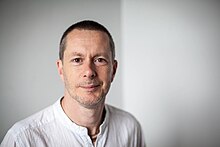Ken Banks

Ken Banks is the founder of kiwanja.net and creator of FrontlineSMS, a mobile messaging application aimed at the grassroots non-profit community. He was the invited opening keynote speaker at the 2009 Humanitarian Technology Challenge [1] and is described as "probably the world’s leading voice in promoting mobile phones as an appropriate technology" in the May/June 2010 edition of World Watch magazine.[2]
Banks is Co-Chair of the W3C Mobile Web for Social Development Group, a member and panelist for the Clinton Global Initiative and on the Advisory Board of a number of non-profit ventures including FrontlineSMS:Medic, Samasource and Question Box. He has written about the role of mobile technology for Didactics World, BBC News, Boston Review, Vodafone Receiver[3] and Stanford University and Harvard University magazines, has a regular on-line column in PC World and National Geographic, and is a judge in the not-for-profit category of the official GSM Association Global Mobile Awards. He also appeared as a special guest on VoxAfrica TV, PRI's The World, CBC's Spark and BBC's Digital Planet. Banks has been interviewed and quoted in a number of mainstream and industry publications including The Economist,[4] the BBC,[5] The New York Times,[6] Time magazine and in a recent UN publication focusing on advances in mobile health.
Banks is a recognized thought-leader in his field, developing the original thinking behind the social mobile long tail and the rise of the reluctant innovator. His ideas are further expanded on at "Build it Kenny, and they will come...".
Banks graduated from the University of Sussex in the UK with honors in Social Anthropology with Development Studies in 1999.[7] Between 2006 and 2007 he was based at Stanford University as a Visiting Fellow on the Reuters Digital Vision Program, and in 2008 was named as one of sixteen Pop!Tech Social Innovation Fellows.[8] In 2009 he was named a Laureate of The Tech Awards. In May 2010, Banks was named a National Geographic Emerging Explorer, an award which "recognizes and supports uniquely gifted and inspiring young adventurers, scientists, photographers, and storytellers - explorers who are already making a difference early in their careers.".[9] Throughout 2011 Banks picked up a further three awards. He was the winner of the Pizzigati Prize for Software in the Public Interest, named an Ashoka Fellow, and picked up the Curry Stone Design Prize for his work with FrontlineSMS.
Banks has lived and worked throughout Africa since the early 1990s in countries including Kenya, Nigeria (where he ran a primate sanctuary), South Africa, Mozambique, Cameroon, Zambia, Uganda and Zimbabwe. He currently resides in Cambridge with his wife.
He has received grants from the MacArthur Foundation, Open Society Institute (OSI), The Rockefeller Foundation, Hivos, and the William and Flora Hewlett Foundation. In May 2010 the Omidyar Network announced additional funding to allow Banks to continue his work.
In 2007 he launched The kiwanja Foundation, a US-based non-profit focused on advancing the potential of mobile technology for positive social and environmental change around the world.
Interviews
- Ken Banks on how technology is driving social and economic change at AfricaGathering
- Taking things a whole lot further in Africa, Nokia interview with Ken Banks
- Canadian Radio (CBC) Interview with Ken Banks (text and audio)
- Interview with Project Diaspora, July 2009
- Interview with Discovery Channel website - "Ken Banks: Cell Phones on the Frontlines" (text and audio)
- VoxAfrica TV appearance (video), August 2009
- National Geographic interview of Ken Banks on " Solving eco challenges with grassroots messaging"
Publications and Chapter Contributions
- "Mobile Phones: An Appropriate Tool for Conservation and Development", co-author, published by Fauna & Flora International, 2004
- "Impact of Mobile Technology" in "Africa's Turn?", ISBN 0-262-01289-8
- "Mobile Healthcare for a Developing World" in "Texting 4 Health: A Simple, Powerful Way to Change Lives" (2009) ISBN 0-9795025-4-3
- "Time To Eat Our Own Dog Food" in "SMS Uprising: Mobile Phone Activism in Africa" ISBN 1-906387-35-4
- "Appropriate Mobile Technologies: Is Grassroots Empowerment for All?" in "Mobile Technologies for Conflict Management: Online Dispute Resolution, Governance, Participation" (2011) ISBN 978-94-007-1383-3|
Awards and Fellowships
- Reuters Digital Vision Program at Stanford University (2006)
- Pop!Tech Social Innovation Fellow (2008)
- Tech Awards Laureate (2009)
- National Geographic Emerging Explorer (2010)
- Winner, Pizzigati Prize (2011)
- Ashoka Fellow (2011)
- Member of the UK Prime Minister's Business Delegation to Africa (2011)
- 2011 Curry Stone Design Prize Winner with FrontlineSMS (2011)
References
- ^ "Technologists Join Development and Health Experts in the Humanitarian Technology Challenge".
- ^ "Think Mobile, Act Local: Leveraging the Rapid Rise in Mobile Phone Usage for Development" (PDF).
- ^ "Africa's grassroots mobile revolution – a traveller's perspective".
- ^ "The meek shall inherit the web". The Economist. September 4, 2008.
- ^ Marwaha, Alka (2009-05-15). "The hi-tech battle for Africa". BBC News.
- ^ Corbett, Sara (April 13, 2008). "Can the Cellphone Help End Global Poverty?". The New York Times.
- ^ "Biography".
- ^ "POPTECH SOCIAL INNOVATION FELLOWS CLASS OF 2008".
- ^ "National Geographic Emerging Explorers Programme".
